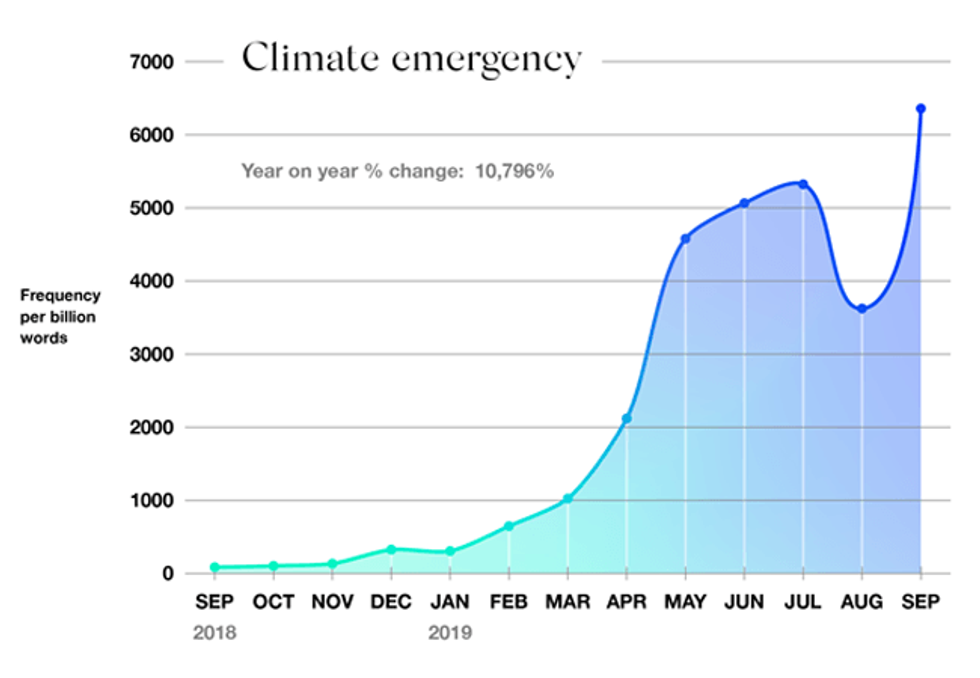Climate advocates and experts celebrated Oxford Dictionaries' announcement Wednesday that "climate emergency" is the Oxford Word of the Year 2019.
Oxford defines climate emergency as "a situation in which urgent action is required to reduce or halt climate change and avoid potentially irreversible environmental damage resulting from it."
The term beat out other climate-related language on Oxford's shortlist, including climate action, climate crisis, climate denial, eco-anxiety, ecocide, extinction, flight shame, global heating, net-zero, and plant-based.
"When we were looking through the evidence, it was just clear that issues relating to the climate were running through all the different lexical items we were working with," Katherine Connor Martin, an editor at Oxford Dictionaries, told The New York Times about the decision. "It reflects it was a real preoccupation of the English-speaking world in 2019."
Usage of climate emergency has "increased steeply" throughout the year, and "by September it was more than 100 times as common as it had been the previous year," according to Oxford's data.
Oxford's official annoucement, published online, offers futher details about the explosive use of the term by scientists, journalists, and the public:
One high profile example of this language development is the changes made by The Guardian in its reporting of environmental news in May. The newspaper stated that instead of climate change, its preferred terms are 'climate emergency, crisis, or breakdown' to describe the broader impact of climate change. The move prompted other media outlets to review and update their own policies and approaches to reporting on the climate.
The Guardian's editor-in-chief Katharine Viner, who outlined the terminology changes, said: 'We want to ensure that we are being scientifically precise, while also communicating clearly with readers on this very important issue. The phrase "climate change," for example, sounds rather passive and gentle when what scientists are talking about is a catastrophe for humanity.'
Language choice in scientific reporting on climate science has been influential in this shift during 2019. With the publication of careful scientific analyses presenting the various consequences for the world's communities should people fail to take action--see the Intergovernmental Panel on Climate Change's special report Global Warming of 1.5 oC, for example--an increasing number of climate scientists have urged their peers to 'tell it like it is' when communicating their research.
Linking to the Times report on Oxford's announcement, meteorologist and science writer Eric Holthaus tweeted, "We are in a climate emergency."
Genevieve Guenther, founder and director of digital activist group End Climate Silence, also shared the Times report on Twitter. "Damn right," she wrote.
A local English chapter of the global Extinction Rebellion movement acknowledged a spike in the term's usage in April, when XR activists held a series of marches, demonstrations, and peaceful civil disobedience around the world to promote the movement's three key demands--including that governments declare a climate and ecological emergency.
Some supporters of Oxford's decision noted that the announcement came two weeks after Collins Dictionary named "climate strike" its 2019 word of the year.
As the Collins website explains, climate strike is "a form of protest that took off just over one year ago with the actions of Swedish schoolgirl Greta Thunberg and which has grown to become a worldwide movement."
The term "was first registered in November 2015 when the first event to be so named took place to coincide with the U.N. Climate Change Conference in Paris, but it is over the last year that 'climate strikes' have spread and become a frequent reality in many of the world's largest cities," according to the website. "Collins' lexicographers observed a 100-fold increase in its usage in 2019."





